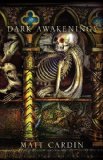Half dark fiction, half academic musings on angels, demons, the dead, and monsters, Dark Awakenings, by Matt Cardin, is an exploration of the common religious goals of transcendence, rebirth, and salvation. So what makes this exploration dark? Cardin’s twist of the knife comes from the enlightened observation that these sorts of religious ideals may have tragic, dire, or even horrific consequences if actually realized. What if the path the pious have been following towards enlightenment turns out to lead to death and destruction? Split into seven short stories and novellas and three academic papers, this book is a rather unique combination of fiction and non-fiction horror writing, and a veritable treasure chest of stories and musings for aficionados of the horror genre.
Cardin’s style is often poetic and brooding, with dense descriptive passages and minimal dialogue, peppered with philosophical musings. His horror attitude is much like a cross between that of Edgar Allen Poe and H. P. Lovecraft—explorations of protagonists reaching for the meaning of life while struggling with inner turmoils, or faced with cosmic horrors. In “The Devil and One Lump,” a macabre version of the Charlie Daniels song “The Devil Went Down to Georgia,” the Devil himself describes of the protagonist, a writer, “You have created protagonists whose very search for salvation produces a backfire effect that damns them to a worse hell than they had ever imagined.” In the fiction stories presented in Dark Awakenings, just so, Mr. Cardin, just so.
The results are quite satisfying for readers desiring stories of the scary and the weird, but those uncomfortable with a spot of blood or the spilling of an internal organ or two may wish to stick with lighter fare. The reader may also be left puzzling the dark religious implications of some of the stories. As with cosmic horror, in the vein of Algernon Blackwood, Sheridan Le Fanu, M. R. James, and H. P. Lovecraft, the horror in Dark Awakenings may not always follow a logical chain. Herein, dark dwarves who crouch low may spring forth at odd angles for cosmic reasons known not to the reader. This is not superficial horror, but horror with implications extending beyond the mundane and having dire ramifications for soul and sanity.
The non-fiction essays in Dark Awakenings are interesting, if academic, musings on the history of angels and demons in supernatural horror: a contemplative analysis of George Romero’s Living Dead films, and an essay on how to read the Biblical book of Isaiah as a work of horror. All these articles shed new information and perspectives on these topics, and are complete with footnotes and suggested readings. For example, we learn about the evolution of the word “demons,” from the historic meaning as being good and bad mediators between God and humans, to the modern interpretation of being the evil minions of the Devil.
In another essay, Cardin shows multiple lenses through which George Romero’s Living Dead zombie films can be viewed. In one section he contrasts how zombies are viewed from a “Western” religious perspective, to how zombies can be viewed from an “Eastern” religious perspective. While thoroughly entertaining, one minor nit is his equivalence of “Western religions” to monotheistic Abrahamic religions imported from the Middle East. True Western religions are the polytheistic religions of the Indians of North and South America, the Norse, the Celts, and the Germani. But once it is clear he’s really contrasting Middle Eastern religious perspectives to Eastern religious perspectives, his analysis of how zombies can be viewed differently based on one’s religious background is informative and interesting.
Also of interest is his use of Roger Schlobin’s three-part taxonomic tool from the essay “Prototypic Horror: The Genre of the Book of Job,” which in Schlobin’s article was used to judge whether or not a given text should be understood as a horror story. Cardin effectively uses this horror-evaluation framework to assess the horror potential of the Biblical book of Isaiah.
So, if you like your horror fiction cosmic and meaningful, or wish for scholarly insights into zombies, demons, and techniques for classifying stories as horror stories, then you will be entirely enchanted with Dark Awakenings. And if you want both your horror fiction and critical analysis in one book, then you will be absolutely thrilled with it.
Get It!
<div class="single-col">
<div class="item">
<h4>
Dark Awakenings, by Matt Cardin:
</h4>
<p>
<a href="http://www.amazon.com/gp/product/0972854568/ref=as_li_tf_il?ie=UTF8&tag=kgweb-20&linkCode=as2&camp=217153&creative=399705&creativeASIN=0972854568"><img border="0" src="http://kendallgiles.4orion.com/wp-content/uploads/2011/06/51gktUwKfLL._SL110_.jpg" alt="dark awakenings, by matt cardin" width="71" height="110" class="size-full wp-image-1887" /><span style="line-height: 60px;">Dark Awakenings, by Matt Cardin</span></a><img src="http://www.assoc-amazon.com/e/ir?t=kgweb-20&l=as2&o=1&a=0972854568&camp=217153&creative=399705" width="1" height="1" border="0" alt="" style="border:none !important; margin:0px !important;" /> </div>
</p>
</div></p>
</div>
